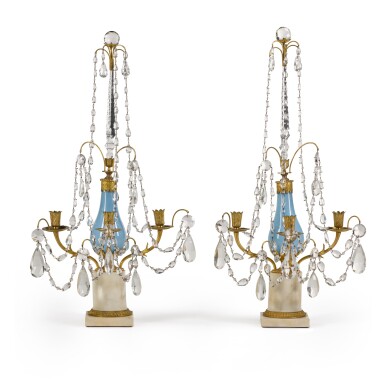Classic Design: Furniture, Clocks, Silver & Ceramics
Classic Design: Furniture, Clocks, Silver & Ceramics

Property from an Important UK Private Collection
A pair of Russian gilt-bronze mounted blue and cut-glass white marble candelabra, attributed to Johann Zech, late 18th century
Lot closes
November 12, 02:24 PM GMT
Estimate
8,000 - 12,000 GBP
Starting Bid
8,000 GBP
We may charge or debit your saved payment method subject to the terms set out in our Conditions of Business for Buyers.
Read more.Lot Details
Description
each in the form of a baluster vase issuing three candlearms supporting a cut-glass prism suspending beads and pear-shaped drops, on a white marble socle and plinth base, en suite with the previous and next lots
each 74cm high, 38cm wide, 21cm deep; 29 1/8in., 14 7/8in., 8 1/4in.
Galerie Steinitz, Paris
In addition to chandeliers, candelabra were also important lighting devices in Russia in the late 18th century as they were perceived as smaller chandeliers. This pair of candelabra was probably executed ensuite with the chandelier and the other pair of identical candelabra in this sale (see lots 86-88). For example, compare the leaves at the base of the chandelier’s corona with the leaves at the base of the vases, the similarities in the nozzles and the use of light blue glass as an elegant contrast to the gilt-bronze, clear glass drops and white marble.
The name of Johann Zech is almost always associated with the production of chandeliers, but glass workshops established in St Petersburg did not only make chandeliers. Indeed, Igor Sychev reveals that by the 1790s, there were a dozen workshops producing chandeliers, lanterns as well as candelabra.
These candelabra often occurred in two different versions: the first with the candlearms issuing from the top of the vase, whilst the second feature candlearms issuing from the base of the vase, as seen in the present. Examples for candelabra in the second category, from collections in St Petersburg, are illustrated in Igor Sychev, The Russian chandelier, 2003, pp.51-53.
There are few examples of chandeliers having survived in situ with candelabra ensuite. The Ostankino museum estate in Moscow gives a glimpse of the effects these matching sets would achieve, see the Blue Room or the Long Gallery with four candelabra and a series of chandeliers (illustrated in Irina Semionova, Ostankino, Résidence princière 18eme siècle, Leningrad, 1981, fig.24, fig.55).
You May Also Like










